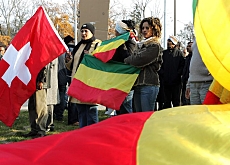Asylum granted to victims of warlords

The Swiss authorities have decided to grant asylum to people seeking protection from so-called non-state agents of persecution, such as militias and clans.
The move follows repeated calls by the United Nations refugee agency and makes Switzerland the last signatory of an international refugee convention to adapt its regulations.
The Asylum Appeal Commission said on Thursday that it had ruled in favour of extending asylum status to people persecuted and threatened by private groups in countries where law and order had broken down.
Until now only citizens who fled conflict and violence which was blamed on the government in their home country were eligible for asylum in Switzerland.
The Federal Refugee Office said the new ruling applied to a very limited group of asylum seekers currently living in Switzerland. They have only had temporary refugee status which limited their rights of residence.
“Under the new regulations the beneficiaries will get better access to the labour market. It also makes it easier to reunite with their families,” said Magnus Hoffmann of the Appeal Commission.
Neighbouring Germany changed its regulations several months ago, according to Hoffmann.
The board had announced several months ago it was considering introducing the legal changes, but it said it wanted to wait for parliament to amend the asylum law.
The new regulations were approved by the House of Representatives and the Senate last year. Voters are due have the final say in a nationwide ballot in September amid criticism by humanitarian groups, churches and centre-left parties about perceived unfair tightening of asylum rules.
Years of haggling
The non-governmental Swiss Refugee Council welcomed the ruling by the Appeal Commission.
“It puts an end to years of discussions about the correct interpretation of the Geneva Refugee Convention,” said the Refugee Council’s Jürg Schertenleib.
“The new group of beneficiaries will receive higher welfare payments and better access to integration programmes. And they face fewer travel restrictions,” he added.
The leading decision by the panel referred to a man who fled to Switzerland from Somalia where he was kidnapped and tortured by the troops of the late warlord, Mohammed Aidid.
An initial request for asylum by the refugee was rejected by the Federal Refugee Office a year ago. He then took the case to the Asylum Appeal Commission.
swissinfo, Urs Geiser
The Asylum Appeal Commission is a special administrative court which can overrule decisions by the Federal Refugee Office.
It was set up in 1992 following years of discussion in parliament and despite opposition by the government.
More than 12,700 cases were filed with the Commission in 2003, but the figures dropped to around 9,000 last year.

In compliance with the JTI standards
More: SWI swissinfo.ch certified by the Journalism Trust Initiative




You can find an overview of ongoing debates with our journalists here . Please join us!
If you want to start a conversation about a topic raised in this article or want to report factual errors, email us at english@swissinfo.ch.